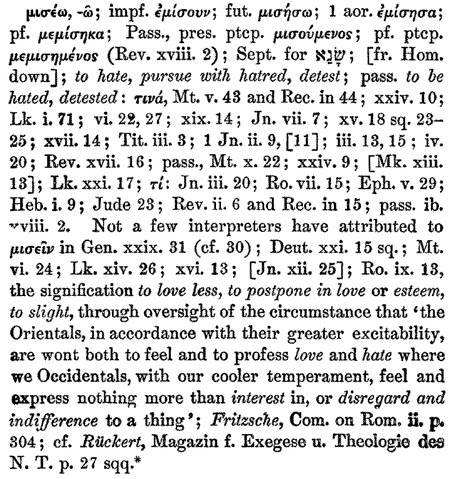---- Answer just looking at Luke 14:26 ----
According to Thayler's lexicon, (as I understand (in the below scan) .. people in the culture were really much like modern Italians and Greeks, and it was common to both love and hate something at the same time, so the greek word used could be interpreted 'love less than':

Also from Vine's Expository Dictionary of New Testament Words:
(b) of a right feeling of aversion from what is evil; said of
wrongdoing, Rom 7:15; iniquity, Hbr 1:9; "the garment (figurative)
spotted by the flesh," Jud 1:23; "the works of the Nicolaitans," Rev
2:6 (and ver. 15, in some mss.; see the AV);
(c) of relative preference for one thing over another, by way of
expressing either aversion from, or disregard for, the claims of one
person or thing relatively to those of another, Mat 6:24; and Luk
16:13, as to the impossibility of serving two masters; Luk 14:26, as
to the claims of parents relatively to those of Christ; Jhn 12:25, of
disregard for one's life relatively to the claims of Christ; Eph 5:29,
negatively, of one's flesh, i.e. of one's own, and therefore a man's
wife as one with him.
--- Answer with other verses included ----
My understanding is that we should be hating everything that gets between us and being a disciple.
It all seems to be about the world hating God's salvation and God's followers hating things that get in the way of it.
Some associated verses (numbers are strongs numbers, note the same basic word for hate):
John 12:15 - He that loveth5368 his846 life5590 shall lose622 it846; and2532 he that hateth3404 his846 life5590 in1722 this5129 world2889 shall keep5442 it846 unto1519 life2222 eternal166.
Luke 19:14 - But1161 his846 citizens4177 hated3404 him846, and2532 sent649 a message4242 after3694 him846, saying3004 , We will23090 not3756 have2309 this5126 [man] to reign936 over1909 us2248.
Luk 21:17 - And2532 ye shall be2071 hated3404 of5259 all3956 [men] for1223 my3450 name's sake3686.
Jhn 15:19 - If1487 ye were2258 of1537 the world2889, the world2889 would302 love5368 his own2398: but1161 because3754 ye are2075 not3756 of1537 the world2889, but235 I1473 have chosen1586 you5209 out of1537 the world2889, therefore51241223 the world2889 hateth3404 you5209.
Mat 6:24 - No man3762 can1410 serve1398 two1417 masters2962: for1063 either2228 he will hate3404 the one1520, and2532 love25 the other2087; or else2228 he will hold472 to the one1520, and2532 despise2706 the other2087. Ye cannot37561410 serve1398 God2316 and2532 mammon3126.
... but ...
We're still commanded to love the sinner, hate the sin:
Mat 5:44 - But1161 I1473 say3004 unto you5213, Love25 your5216 enemies2190, bless2127 them that curse2672 you5209, do4160 good2573 to them that hate3404 you5209, and2532 pray4336 for5228 them which3588 despitefully use1908 you5209, and2532 persecute1377 you5209;

hate,I would think if this is not what Jesus actually meant, then about half those translations would have softened it. Indeed, the original Greek is alsohate. Granted this was written 30-40 years after the fact, I guess it depends on whether your hermeneutical approach is to think that the Bible quotes Jesus exactly, so many years later. I have my doubts :)